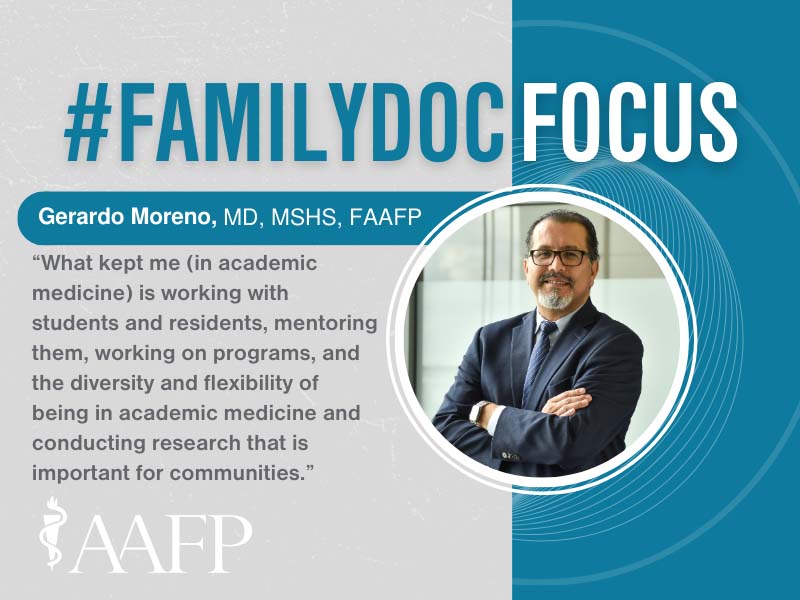UCLA Mentor Honored for Work in Underserved Communities
Jan. 18, 2024, David Mitchell — Gerardo Moreno, M.D., M.S.H.S., FAAFP, was pondering a career in chemistry when he realized he wouldn’t be content working in a lab.

“I was missing the connection with people,” he said. “I wanted to do something that had an impact on community.”
A friend referred Moreno to a summer program led by family physician Salvador Sandoval, M.D., M.P.H., and his career path soon changed.
“I shadowed a family doctor in a rural farming community,” said Moreno, a child and grandchild of farm workers who earned his undergraduate degree at San Jose State University in California. “I saw the personal connections he had with his patients and the involvement he had in the community. That really spoke to me, coming from an agricultural community where there was a lack of health care access.”
Sandoval practiced in community clinics around Merced, Calif., for more than 40 years. Moreno said his mentor would drive as far as Sacramento (more than 100 miles) to work with students at a free clinic.
“He would do community outreach and education in the community with farm workers,” said Moreno, professor, chair and executive medical director in the University of California, Los Angeles, Department of Family Medicine. “I was an environmental studies major, so I always had that broad view of how community and place impacts a person. Seeing a physician who approached medicine from a broad perspective, trying to impact health outcomes from a community level, really appealed to me and inspired me.”
Moreno attended UCLA’s David Geffen School of Medicine and completed his family medicine residency training in 2007 at the University of California, San Francisco. That same year he became a clinical instructor in UCLA’s Department of Family Medicine and has been there ever since.
“What drew me into academic medicine was that I saw a need for it to be more community- and family medicine-oriented,” said Moreno, who serves on the Board of Directors for the Annals of Family Medicine and is a reviewer for other journals, including JAMA and Academic Medicine. “What kept me here is working with students and residents, mentoring them, working on programs, and the diversity and flexibility of being in academic medicine and conducting research that is important for communities.”
Moreno was a co-director of UCLA’s Program in Medical Education - Leadership and Advocacy (PRIME-LA) for three years before becoming its executive director in 2016. He said PRIME was a “ traditional M.D./M.P.H. program” before he revamped it with an emphasis on leadership and advocacy for underserved communities. The competitive, five-year program admits 18 students per year .
“It focuses on creating a different type of physician,” said Moreno, who is involved in all facets of the program, including developing curriculum, admissions and mentoring. “And it’s been great because the most common specialty for students has been family medicine. We’ve all been scratching our heads on how to increase the number of students choosing family medicine. The most common specialty in PRIME is family medicine — by far — because it has a focus on underserved communities, including rural and urban underserved communities.”
Forty-six percent of PRIME participants match in family medicine residencies, and more than 90% of participants who have graduated in the past six years have indicated a preference to practice in underserved areas.
“The admissions process is actually a very key part,” Moreno said. “If you want students who are going to choose careers in primary care and family medicine, you’ve got to select the right students: students from rural areas, students who have worked with primary care docs and had exposure to primary care, and those who have signaled that they want to do primary care.”
Moreno still devotes 20% of his time to patient care and 20% to research, in addition to his teaching and administrative duties. He serves on numerous committees and task forces at UCLA, including the medical school’s Executive Admissions Committee and its Equity and Diversity Inclusion Committee. He also has served in a variety of national leadership roles. Moreno has served on the Board of Directors of the American Board of Family Medicine since 2018 and is the current chair.
In October, he was one of 100 individuals honored with election to the National Academy of Medicine. In its announcement, NAM touted Moreno as “one of the most influential young Latino academic leaders in family medicine and health care.” It also praised his research and programs related to mentoring minority students and advocating for state and federal policies that diversify the health care workforce, and his focus on caring for underserved communities.
Moreno encourages his students to take a similar path. Service and leadership are part of the curriculum in the PRIME program. Participants manage year-long projects that provide opportunities to learn more about patients and the community.
“Health doesn’t happen in a 15-minute visit in the exam room,” he said. “Health really happens in a person’s family and environment. With service, you get an inside view of what patients and the community really need and how important it is to have access to primary care.”